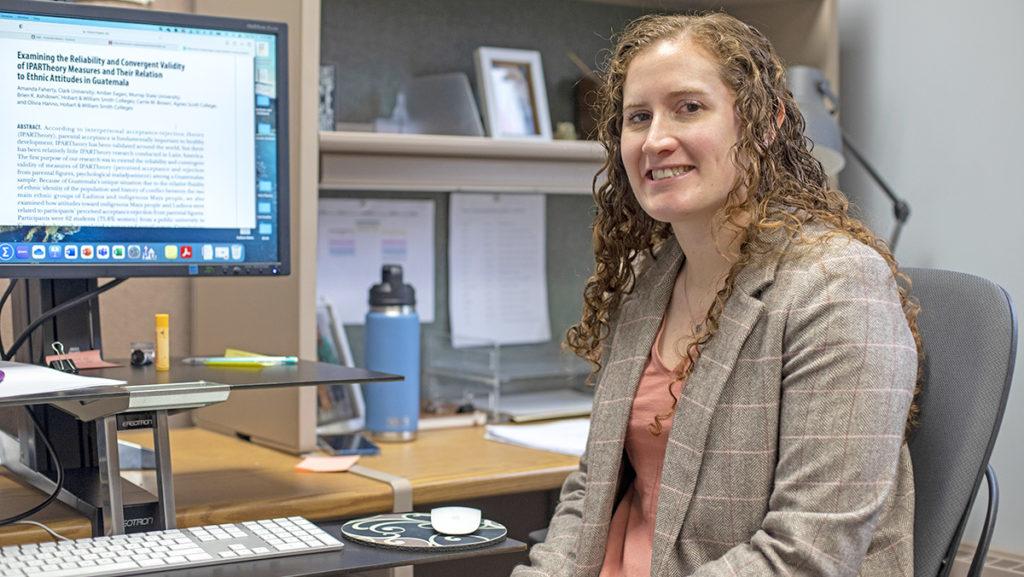The Society for Cross-Cultural Research, an international organization, has awarded Amanda Faherty, assistant professor in the Department of Psychology at Ithaca College, the Leigh Minturn Memorial Prize for Early Career Cross-Cultural Research.
Faherty will accept the research award in February in Puerto Rico at the annual SCCR conference. The SCCR recognizes professionals and students in the social science disciplines of psychology, sociology and related fields. Faherty’s current research focuses on how society and culture impact the relationships between parents and children and the development of the children.
Contributing writer Ashan Chandrasena sat down with Faherty to discuss the award and her research.
This interview has been edited for length and clarity.
Ashan Chandrasena: What was it like winning the award?
Amanda Faherty: My initial reaction [to winning the award] was just surprised that I had won it. I think that I have a lot of different research projects up in the air and in the works but I haven’t necessarily been able to complete as many of my research projects as I’ve wanted to … I think that they recognized the constraints that I was under and also my potential for publishing a lot of the studies that I’m currently working on. [I’m] definitely surprised but also just really honored. … When you go to those conferences you get to know a lot of the individuals that have won this award in the past and they are fantastic researchers, people that I strive to look up to and to be in terms of a researcher.
AC: What are some applications of the research you are conducting?
AF: Application oftentimes occurs after the research projects. Our work in Guatemala [looks] at parent-child relationships. We’ve tried to use some of our findings … to support the researchers and help their training for working with different individuals of different ages, specifically adolescents, and then later as they age. That’s one specific application of my research and hopefully, I strive to have my research be applied in other ways. [I am] looking at how we could get into different types of youth programs, and hold different types of parenting classes.
AC: What do you believe sets your research apart from other entries?
AF: I don’t know who the other people who were nominated for this research award are. I think that my research is interesting, and also a little bit different in trying to understand the cultural foundations of that parent-child relationship. Oftentimes, we’re interested in studying that parent-child relationship, and how that relates to well-being, we’re also really used to doing it during the periods of childhood and adolescence. I’m looking at emerging adulthood, which is something new. And that’s a relatively new period of the lifespan. So I think that that’s one aspect that sets me apart, but also really understanding the cultural foundations, we tend to think that parent-child relationships exist in a vacuum, that there’s one right way to parent. And that’s not the case. We have to understand the different cultural implications. Also, what cultural value is going to be the correct way to parent right? There’s no correct way to parent. In my mind, it has to be grounded in one’s culture, to understand what they’re valuing, and then what parents would expect out of their children.
AC: What are future areas of research you are looking to extend your work into?
AF: That’s also the fun part of doing research, you get to think about new ways to extend to different populations and even different ideas. We’re starting to look at if there is the existence of emerging adulthood in Guatemala, and so emerging adulthood is this time in the lifespan, 18 to 29, where individuals [are] oftentimes delaying adulthood roles, and some characteristics that are common at that time. We do see that emerging adulthood doesn’t exist in all cultures. … We’re looking at Guatemala, which is a developing country, and seeing if there’s any sort of pattern for individuals during this time to delay those adulthood roles. So that’s one way I’m extending my research. Another way I’m looking to extend my research is by looking at emerging adulthood in Dubai and seeing what those distinct features are, and then also how their culture is influencing parent-child relationships during that time.
AC: What advice do you have for students or other individuals interested in conducting research in the future?
AF: I would just say try to get involved as quickly as possible. Ask around for opportunities. I know our psychology department is awesome in that it’s a requirement that individuals get involved in research. Oftentimes, people just don’t understand what research is, they don’t know what it’s about. … [One] of the classes that I teach is our research team. Once you’re exposed to research, you learn a lot of skills, even if you’re not going to conduct research in the future. Just try to get involved and look for different opportunities.








